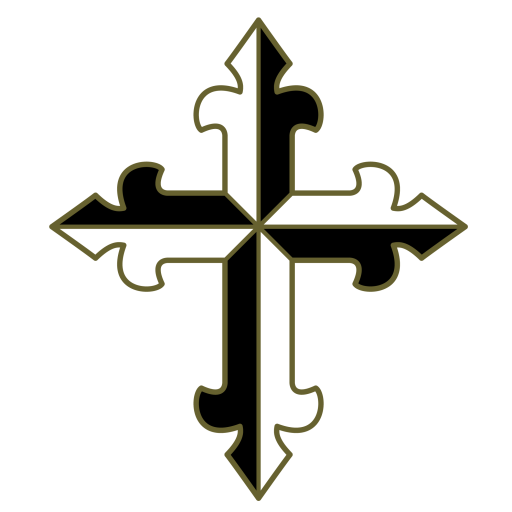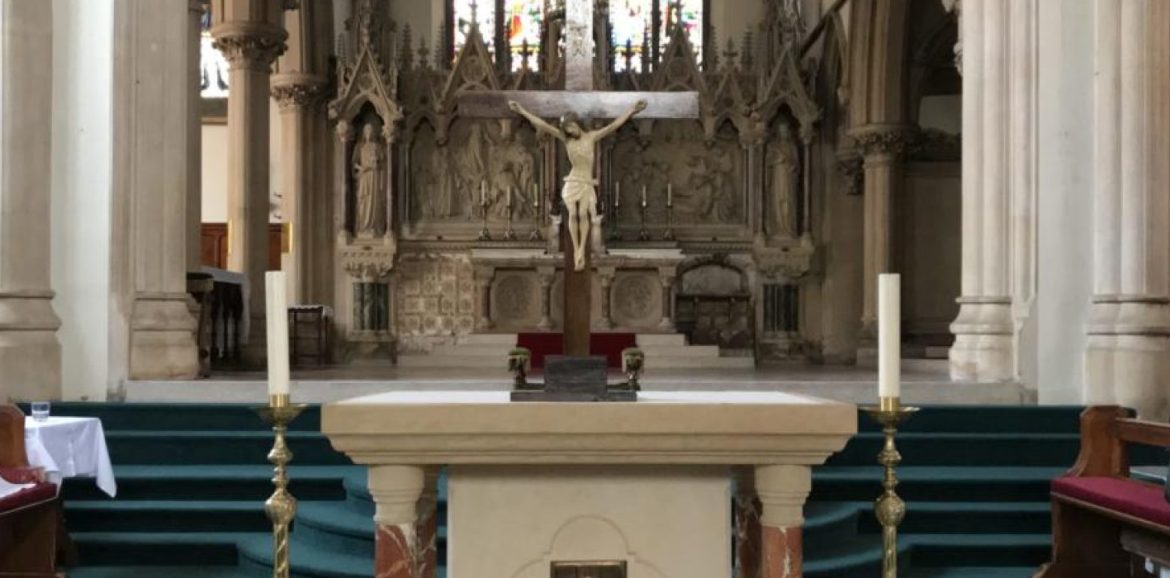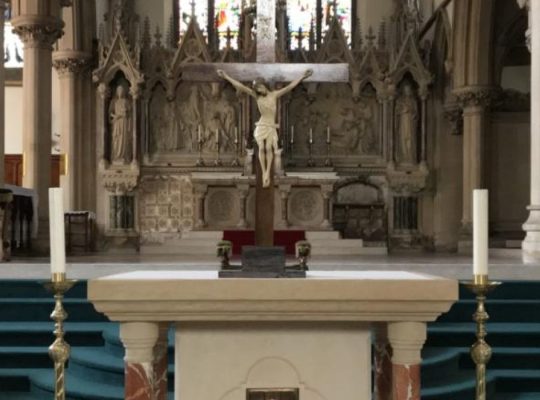Welcome to the great Feast of Christ the King, or to be more precise the Solemnity of Our Lord Jesus Christ, King of the Universe. There was no great need for lengthy research to find in Matthew’s Gospel the passage that was appropriate to the Feast of Christ the King: the passage we hear today concludes the great discourse of Jesus on his coming at the end of time and was an obvious choice. It proposes for our contemplation the solemn intervention of the Son of Man when he “comes in his glory, and all the angels with him.” Taking “his glorious throne” in order to judge all nations, he will appear as the king of the universe who has received the power to give to those blessed by his Father the inheritance of the kingdom, prepared for them “from the foundation of the world.”
The Gospel passage sheds full light on the nature and object of Jesus’ mission. He came to proclaim it: “Repent, for the kingdom of heaven is at hand.” By his words and acts, he never stopped teaching that the kingdom has been prepared for the little and the poor ones, to whom God will do justice, and for those who are like them. “Rejoice and be glad, for your reward will be great in heaven.” To all, he gives this solemn admonition: “My disciples are not those who say Lord, Lord, but those who act in accordance with their faith, those who are merciful toward others because the two commandments of love of God and love of neighbour are one commandment.” The judgement scene, as shown in Matthew’s Gospel, is the summit of this teaching and further enhances it. Indeed, the evangelist shows that all will be judged on what they will have done or not done for those who were hungry and thirsty, strangers, naked, sick, prisoners, those whom from the beginning of his ministry Jesus declared blessed. “You did for me…..You did not do for me.” And let’s not fool ourselves into thinking that we are doing what the Lord asks and yet we are doing nothing at all! Let’s not be like the servant who “buried the Talent entrusted to him in the ground.”
It will be the great surprise of the former, [You did it for me] even if they did not know that the Lord had identified himself with the little ones. As to the latter, [You did not do it for me] “these will go off to eternal punishment.” They will have no excuse because they, as we, have been duly warned: “Not everyone who says to me ‘Lord, Lord,’ will enter the kingdom of heaven…..Many will say to me on that day, ‘Lord, Lord, did we not prophesy in your name? Did we not drive out demons in your name? Did we not do mighty deeds in. Your name? Then I will declare to them solemnly, ‘I never knew you. Depart from me, you evil doers.’” The works of mercy that we shall have done or neglected to do— “almsgiving” will judge us.
Christ is King. But this title does not just designate him as a powerful one among or above the powerful of the earth. In the traditions of the cultures of the Middle East, this title refers to the concept of God as Shepherd-King of his people, who tends the frailest sheep of his flock. The King is the one who does justice to the weak and the poor whom he protects against the powerful and the tyrannical power they exercise toward the defenceless and those threatened by injustice. God is this perfect King who acts with mercy, compassion, and tenderness. “For he shall rescue the poor man when he cries out, and the afflicted when he has no-one to help him. He shall have pity for the lowly and the poor; the lives of the poor he shall save.” (Ps 72:12-13)
In our first reading, Ezekiel confirms this. In civilizations and cultures where pastoral experience is strong, the metaphor of the shepherd is very rich. This is the case in the Bible. Shepherds exercise an undisputed authority over their flock, but at the same time they are very close to their sheep, surround them with care and thoughtfulness, knowing whether each one of the ewes is doing well or not, drives them with much prudence. This is why the Bible compares leaders of the people, kings, and even God, to shepherds. The passage from the Book of Ezekiel, read this year for the Feast of Christ the King of the Universe, belongs to this tradition.
God does not entrust to others the care of the flock he owns, like a good shepherd, he himself looks after it. All the verbs and all the expressions used to describe the model shepherds activity refer to what God does for his people: “[I will] tend my sheep, I will rescue them from every place where they are scattered when it was cloudy and and dark….I myself will pasture my sheep; I myself will give them rest, says the Lord God. The lost I will seek out, the strayed I will bring back, the injured I will bind up, the sick I will heal [but the sleek and the strong I will destroy], shepherding them rightly.” We must not overlook the last sentence, particularly important in the context of this Sunday’s celebration: “As for you, my sheep, says the Lord God, I will judge between one sheep and another, between rams and goats.” God the Good Shepherd will intervene to maintain order in his flock. He will not allow the weak to be bullied by the strong; he will push these away in order to protect the more vulnerable.
A certain iconography has popularized the image of the sweet Good Shepherd with soft features, devoid of any strength of character. Nothing could be farther from reality. Although, full of tenderness for his sheep, a shepherd does not resemble in the least these mawkish representations. He is a man with a weather-beaten face and piercing eyes that are used searching the horizon, a walker who is able to cover long distances and climb slopes at the head of his flock, or in search of the lost sheep, often a sage who has the time to think and reflect in solitude. But he is also a strong person who does not take lightly the welfare of his flock, who raises his voice and acts threateningly in order to bring back to the right path the recalcitrant sheep. His almost motherly solicitude towards the lambs and their sick or tired mothers is the more touching. He thinks of himself only after the flock has entered the sheepfold or is settled in the pasture. Such is our God in whom we can have trust, such is our King, our Lord, our God, for: “The Lord is my Shepherd; there is nothing I shall want.”
Jesus has revealed this divine kingship. He calls the little ones his brothers and sisters. He does so not because he belongs to their world by his birth and shares a sort of class kinship with them, but because he is the Son and the Image of the Father and shares the same sentiments. This is why he recognises his own, those who act like him, are animated by the same effective charity, feed the hungry, see to the needs of the destitute, liberate prisoners.
When he comes back in his glory and gives his royal power in homage to God, he will introduce into his kingdom those who will have acted as he did. “Your kingdom is not of this world Lord Jesus, since you carry this world on your shoulders as a shepherd, his lost sheep. To show your dominion, no other sceptre than your cross, no other strength than your mercy: no other right than your victorious love. You offer to us your life in exchange for our death, because your power wants to give us back to ourselves and snatch us out of the yolk of remorse. Your kingdom already inhabits us, Lord Jesus; at your word the child in us rises, you recreate it almost unbeknown to us. Everything journeys in you toward its beauty; still frail, joy touches the earth; heaven is near, near, its radiance.” (Commission Francophone Cistercienne)


